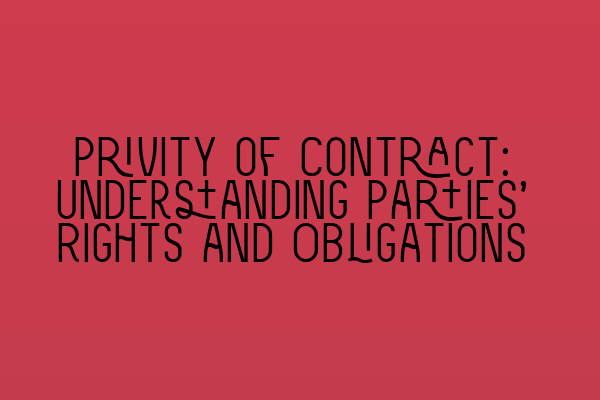Privity of Contract: Understanding Parties’ Rights and Obligations
Welcome to SQE Contract Law, where we strive to simplify complex legal concepts and provide clarity on the intricacies of contract law. In this article, we will delve into the concept of privity of contract, exploring the rights and obligations of parties involved. Privity of contract forms the foundation of contractual relationships, defining the scope of legal rights and responsibilities. By understanding this fundamental principle, you can navigate contracts with ease and confidence.

What is Privity of Contract?
Privity of contract refers to the legal relationship that exists between the parties to a contract. It is a doctrine that recognizes that only those who are party to a contract can enforce its terms or be held liable for the breach of its obligations. Essentially, privity of contract determines who has the right to enforce the contract and who is bound by its terms.
Let’s break it down further:
The Parties
In any contract, there are two key parties: the promisor and the promisee. The promisor is the party who makes the promise, while the promisee is the party to whom the promise is made. These parties are known as the contracting parties.
For example, in a contract for the sale of goods, the seller is the promisor, and the buyer is the promisee. The seller promises to deliver the goods, and the buyer promises to pay the agreed price.
The Third-Party Dilemma
Privity of contract becomes particularly relevant when a dispute arises involving a third party who is not a party to the original contract. The third party may be someone who benefits from the contract or someone who seeks to enforce its terms.
Previously, under the common law, a third party had no rights or obligations under a contract unless expressly stated or implied by law. However, in recent years, legislative reforms have expanded the rights of third parties in certain circumstances. To explore this topic further, check out our article on Exploring Third Party Rights in Contract Law: Implications and Boundaries.
Enforcing Rights and Obligations
Now that we have established the concept of privity of contract, let’s discuss how parties can enforce their rights and obligations under a contract.
When two parties enter into a contract, they both have certain rights and obligations. These rights and obligations are typically spelled out in the contract itself. However, it is essential to note that each party’s rights and obligations are contingent upon the performance or non-performance of the other party.
If one party fails to fulfill their obligations under the contract, the other party may have various options to enforce their rights, such as:
- Seeking damages for breach of contract
- Specific performance (i.e., compelling the defaulting party to fulfill their obligations)
- Rescission (i.e., canceling the contract)
- Reformation (i.e., modifying the terms of the contract)
To gain a comprehensive understanding of these enforcement mechanisms, we recommend reading our article on Discharge of Contracts: Modes and Consequences Explained.
Conclusion
Privity of contract sets the framework for parties’ rights and obligations in a contract. Understanding this principle is crucial for any individual involved in contract law, whether as a professional or a student. By grasping the concept of privity of contract, you will be empowered to navigate contractual relationships with confidence and clarity.
For more simplified explanations of complex contract law concepts, be sure to explore our Contract Law Tutorials: Simplifying Complex Concepts for Students section.
Thank you for reading, and we hope this article has shed light on the importance and intricacies of privity of contract. If you have any further questions or would like professional guidance related to your specific legal situation, do not hesitate to reach out to our team of expert solicitors at SQE Contract Law.
